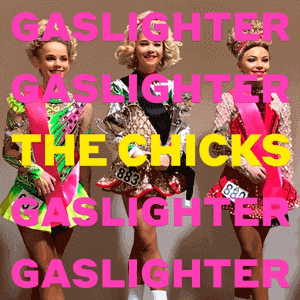The Chicks (previously known as the Dixie Chicks) broke their 14-year hiatus this summer with the release of their eighth studio album “Gaslighter” on Friday, July 17. The Chicks saw their mainstream success somewhat halted in 2004 after their lead singer, Natalie Maines, criticized President Bush and the invasion of Iraq while playing a concert in London. Maines’ statement caused the band to be blacklisted from country radio, eventually contributing to their hiatus. Unlike the band’s previous work, which took an overtly political stance after their blacklisting in 2004, the new LP is less political and more heartfelt. In “Gaslighter,” The Chicks take a step away from the political arena to give their listeners a window into Maines’ divorce from Adrian Pasdar. In fact, this album was so personal for Maines that Pasdar tried to sue prior to the release of the LP for access to the songs.
“Gaslighter,” the titular and first song on the album, blends The Chicks’ classic country sound with a more modern pop sound. The song, like much of the album, tells the story of Maines’ divorce from ex-husband Pasdar. “Gaslighter” sets the tone for the album, juxtaposing the heavier themes that The Chicks discuss with a light, upbeat sound. This sound and mix of genres makes sense for the band’s new era, especially given The Chicks’ addition of Jack Antonoff as a co-writer and producer on the album. Antonoff is best known for producing and co-writing songs like “Out of the Woods” and “Paper Rings” with Taylor Swift and “Supercut” and “Green Light” with Lorde. The choice of Antonoff as a producer and co-writer on the album is a significant one, especially given that this album marks The Chicks’ greatest movement towards pop from country to date, and Antonoff helped Taylor Swift make this same transition.
This transition to a more pop-centric sound can be heard in “Sleep at Night,” the second song on the album. “Sleep at Night” begins the retelling of Maines’ divorce to a catchy pop-country tune. Maines sings, “You’re only as sick as your secrets / So I’m telling everything / Half of this shit you won’t believe / But I know it’s not unique to me.” These lines tell listeners that this will be a personal and painful story, but one that (in classic Chicks form) is also empowering and upbeat. Maines begins by seemingly addressing Pasdar about his infidelity, directly saying: “Remember you brought her to our show at the Hollywood Bowl / She said, ‘I love you, I’m such a fan’ / I joked you can love me as long as you don’t love my man / There is nothing funny about that.” Maines continues this story throughout the album, revisiting how she met Pasdar at the second wedding of Chicks singer Emily Robison Strayer in “My Best Friend’s Weddings.” Much like “Sleep at Night,” “Tights On My Boat,” the eighth song on the album, functions as a sort of aha moment for Maines — a triumphant song to her ex-husband as she tells him that he can “tell the girl who left her tights on my boat that she can have you now.”
“Everybody Loves You,” the fourth track on the album, is a cover of the song by the same name by Charlotte Lawrence about her experience of sexual violence. The Chicks cover this song with vocals from Maines, accompanied with an acoustic backing track that blends the original with a more country feel that fits the band’s genre and style. The cover by The Chicks is a poignant and beautiful addition to the album.
However, one track on The Chicks’ new album does speak more to politics than it does to Maines’ divorce: “March March.” Released in an EP in mid-June, the sixth track of “Gaslighter” is a modern protest anthem. The band strategically used the “March March” music video to simultaneously announce their rebranding from the Dixie Chicks to The Chicks and their support for the Black Lives Matter movement.
The final three tracks on the album — “Young Man,” “Hope It’s Something Good” and “Set Me Free” — mark a turn from the album’s more upbeat tone. These last three songs together compose a poignant finale coda from Maines as she bares her soul to listeners. “Young Man” is a letter to her sons as she tells them to find their own way in the aftermath of her relationship with Pasdar. “Young Man” sees Maines’ vocals accompanied with the soft pop acoustic backings that accompany much of the latter half of the album and Antonoff’s other works. This blend of acoustics, while different from the sound that has classically been associated with The Chicks, works well in rounding out the album with heartfelt music filled with deeper meaning. This blend is especially well-received in “Hope It’s Something Good,” where Maines sings “after so long I learned to hold my tongue, and now that you’re done I get to write this song” with an intensity amplified by the soft pop-country backing of the track. This intensity of subject matter paired with a soft backtrack produces one of the album’s most heartfelt numbers in the penultimate track “Set Me Free”: a note to Maines’ ex asking him to sign their divorce papers and release her. This track masterfully delivers a dual meaning of also asking their listeners to release their old expectations for the trio and instead welcome a new era for The Chicks that sees the seasoned country musicians as personal and political at once.
Contact Ari Gabriel at arijgab ‘at’ stanford.edu and Sophia Gibson at sgibson ‘at’ urbanschool.org.
